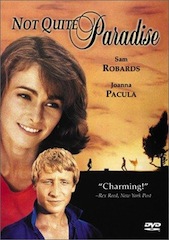Top Qs
Timeline
Chat
Perspective
Not Quite Paradise
1985 British film From Wikipedia, the free encyclopedia
Remove ads
Not Quite Paradise is a 1985 British comedy-drama directed by Lewis Gilbert. It was originally released in Europe under the title Not Quite Jerusalem, adapted by Paul Kember from his 1982 play of the same name.
It was filmed on two kibbutzim, Eilot and Grofit, as well as at the Mikveh Israel Agricultural School.[1]
The soundtrack was composed by Rondò Veneziano and relasead in the UK as Not Quite Jerusalem.
Remove ads
Plot
Six naive British and American volunteers arrive on kibbutz Kfar Ezra for a working holiday, exchanging their labour for the opportunity to experience first-hand its unique collective lifestyle. When Mike (Sam Robards), a young medical student, falls in love with Gila (Joanna Pacuła), the Israeli girl who is organising the volunteers' work and accommodation, he must choose between a life with her and returning home.
Remove ads
Cast
- Joanna Pacuła as Gila
- Sam Robards as Mike
- Kevin McNally as Pete
- Todd Graff as Rothwell T. Schwartz
- Selina Cadell as Carrie
- Ewan Stewart as Angus
- Bernard Strother as Dave
- Kate Ingram as Grace
- Gary Cady as Steve
- Naomi Rosenberg as Finnish Twin
- Schuli Rosenberg as Finnish Twin
- Yaacov Ben Sira as Dobush
- Esti-Katz as Rivka
- Aharon Greener as Asher
- Zafrir Kochanovsky as Menachem
- Libby Morris as Mrs. Schwartz
- Bernard Spear as Mr. Schwartz
- Poly Reshef as Ami
- Irit Frank as Nurse
Remove ads
Production
The film was originally meant to star Julie Walters who had just appeared in the previous film from Lewis Gilbert, Educating Rita.[2] The movie was financed off the back of the success of Educating Rita but was not received with the same critical or commercial acclaim.[3]
Critical reception
Summarize
Perspective
Not Quite Paradise received very poor reviews. Nina Darnton of The New York Times panned the film as "an example of a good idea spoiled by a hackneyed, heavy-handed script, awkward directorial pacing, and posed acting... The script, while trying to humorously characterize national stereotypes, succeeds only in being insulting."[4] Joe Baltake of Philly.com called it "annoyingly schizophrenic – thuddingly humorless when it isn't shockingly offensive."[5] In a savage review in the Los Angeles Times, Patrick Goldstein argued that an "awkward" and "uneven" script, "a paucity of intriguing characters", and an overwrought soundtrack of quivering violins "delivers a dreary, cliché-ridden film with all the wallop of a sheaf of crumbling parchment paper."[6]
London's Time Out contrasted the "strong material" in Paul Kember's original play to this melodramatic, "caramelized" screen version: "Gilbert has created a toffee-apple with the apple removed: bite through the sweet crust of romantic Holy Land locations, handsome Israelis, dashing Arab terrorists and corny jokes, and what remains is sheer emptiness."[7] TV Guide was equally dismissive, noting, "the world of an Israeli kibbutz is reduced to a few simple-minded cinematic clichés... no different from a boarding school or overnight camp. The only really indigenous thing to be found here is the beautifully photographed Israeli scenery, which borders on travelog material rather than background setting."[8]
Remove ads
References
External links
Wikiwand - on
Seamless Wikipedia browsing. On steroids.
Remove ads

